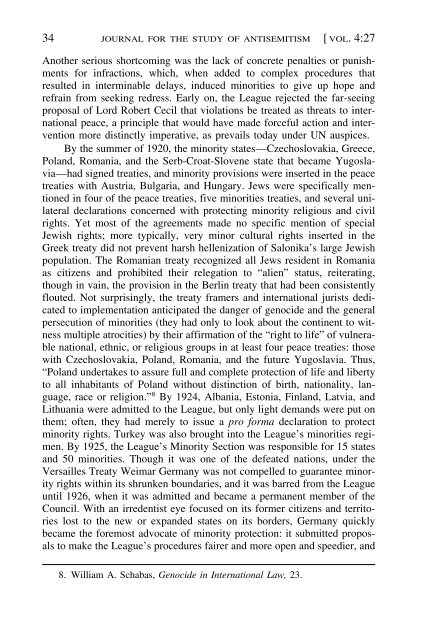Volume 4 No 1 - Journal for the Study of Antisemitism
Volume 4 No 1 - Journal for the Study of Antisemitism
Volume 4 No 1 - Journal for the Study of Antisemitism
Create successful ePaper yourself
Turn your PDF publications into a flip-book with our unique Google optimized e-Paper software.
34 JOURNAL FOR THE STUDY OF ANTISEMITISM [ VOL. 4:27<br />
Ano<strong>the</strong>r serious shortcoming was <strong>the</strong> lack <strong>of</strong> concrete penalties or punishments<br />
<strong>for</strong> infractions, which, when added to complex procedures that<br />
resulted in interminable delays, induced minorities to give up hope and<br />
refrain from seeking redress. Early on, <strong>the</strong> League rejected <strong>the</strong> far-seeing<br />
proposal <strong>of</strong> Lord Robert Cecil that violations be treated as threats to international<br />
peace, a principle that would have made <strong>for</strong>ceful action and intervention<br />
more distinctly imperative, as prevails today under UN auspices.<br />
By <strong>the</strong> summer <strong>of</strong> 1920, <strong>the</strong> minority states—Czechoslovakia, Greece,<br />
Poland, Romania, and <strong>the</strong> Serb-Croat-Slovene state that became Yugoslavia—had<br />
signed treaties, and minority provisions were inserted in <strong>the</strong> peace<br />
treaties with Austria, Bulgaria, and Hungary. Jews were specifically mentioned<br />
in four <strong>of</strong> <strong>the</strong> peace treaties, five minorities treaties, and several unilateral<br />
declarations concerned with protecting minority religious and civil<br />
rights. Yet most <strong>of</strong> <strong>the</strong> agreements made no specific mention <strong>of</strong> special<br />
Jewish rights; more typically, very minor cultural rights inserted in <strong>the</strong><br />
Greek treaty did not prevent harsh hellenization <strong>of</strong> Salonika’s large Jewish<br />
population. The Romanian treaty recognized all Jews resident in Romania<br />
as citizens and prohibited <strong>the</strong>ir relegation to “alien” status, reiterating,<br />
though in vain, <strong>the</strong> provision in <strong>the</strong> Berlin treaty that had been consistently<br />
flouted. <strong>No</strong>t surprisingly, <strong>the</strong> treaty framers and international jurists dedicated<br />
to implementation anticipated <strong>the</strong> danger <strong>of</strong> genocide and <strong>the</strong> general<br />
persecution <strong>of</strong> minorities (<strong>the</strong>y had only to look about <strong>the</strong> continent to witness<br />
multiple atrocities) by <strong>the</strong>ir affirmation <strong>of</strong> <strong>the</strong> “right to life” <strong>of</strong> vulnerable<br />
national, ethnic, or religious groups in at least four peace treaties: those<br />
with Czechoslovakia, Poland, Romania, and <strong>the</strong> future Yugoslavia. Thus,<br />
“Poland undertakes to assure full and complete protection <strong>of</strong> life and liberty<br />
to all inhabitants <strong>of</strong> Poland without distinction <strong>of</strong> birth, nationality, language,<br />
race or religion.” 8 By 1924, Albania, Estonia, Finland, Latvia, and<br />
Lithuania were admitted to <strong>the</strong> League, but only light demands were put on<br />
<strong>the</strong>m; <strong>of</strong>ten, <strong>the</strong>y had merely to issue a pro <strong>for</strong>ma declaration to protect<br />
minority rights. Turkey was also brought into <strong>the</strong> League’s minorities regimen.<br />
By 1925, <strong>the</strong> League’s Minority Section was responsible <strong>for</strong> 15 states<br />
and 50 minorities. Though it was one <strong>of</strong> <strong>the</strong> defeated nations, under <strong>the</strong><br />
Versailles Treaty Weimar Germany was not compelled to guarantee minority<br />
rights within its shrunken boundaries, and it was barred from <strong>the</strong> League<br />
until 1926, when it was admitted and became a permanent member <strong>of</strong> <strong>the</strong><br />
Council. With an irredentist eye focused on its <strong>for</strong>mer citizens and territories<br />
lost to <strong>the</strong> new or expanded states on its borders, Germany quickly<br />
became <strong>the</strong> <strong>for</strong>emost advocate <strong>of</strong> minority protection: it submitted proposals<br />
to make <strong>the</strong> League’s procedures fairer and more open and speedier, and<br />
8. William A. Schabas, Genocide in International Law, 23.














